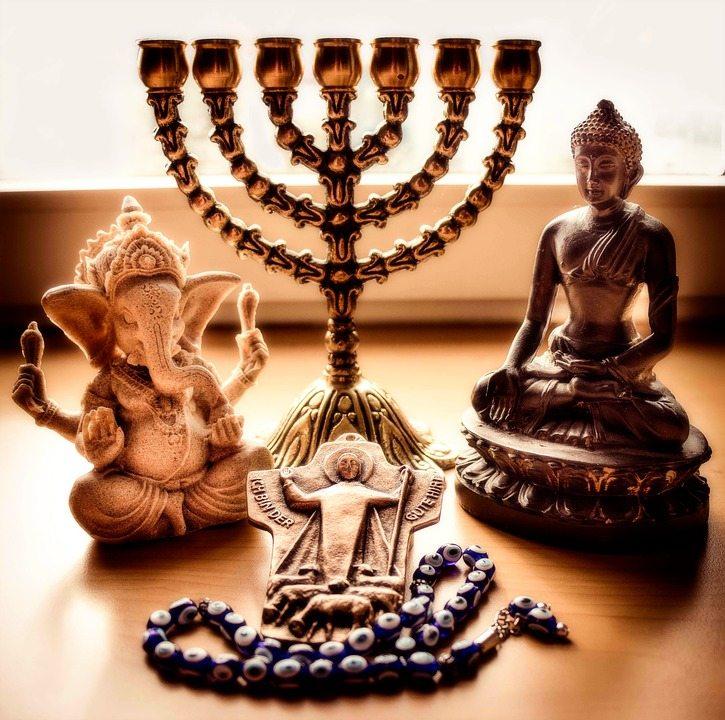Almost everyone is familiar with Christmas in the United States. Whether you are a little kid who thinks it’s the day when Santa sneaks down the chimney to leave presents or an adult who appreciates the time off work, it is a familiar time of year. Yet, what about the other December holidays around the world?
Hanukkah
Let’s start with another familiar holiday, Hanukkah. This year Hanukkah will be from Dec. 12 to Dec. 20. It is a Jewish holiday known as the “festival of lights.” The word “Hanukkah” means dedication, and it is observed in remembrance of the rededication of the Holy Temple. In the second century, the Syrian-Greeks tried to force the people of Israel to accept Greek culture. However, Judah the Maccabee and a small group of faithful Jews defeated a mighty army and retook the temple in Jerusalem. When they went to light the Menorah only a small amount of oil was left and yet it lasted eight days (chabad.org). Each night of Hanukkah, a candle is lit to commemorate this miracle.
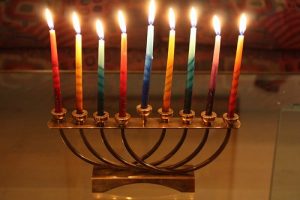
Kwanzaa
Kwanzaa was created in 1966 with the intention of bringing African American people together. It is the holiday of “first fruit” which is how the African people referred to their harvest festivals. It begins with the lighting of Kinara. The Kinara holds the seven candles of Kwanzaa beginning with the central black candle. Each night as the candles are lit each of the seven principles are discussed. These include unity, self-determination, collective work and responsibility, cooperative economics, purpose, creativity and faith.
http://www.officialkwanzaawebsite.org/index.shtml

Yule
Yule is the Wiccan celebration of the winter solstice. A time when darkness yields to light as the days grow longer. A surprising number of Christmas traditions come from this little-known holiday. Holly is used to decorate the house to invite spirits in for good luck. The trees are “wassailed” with spiced cider and orange and clove pomanders come from Yule. Even mistletoe was harvested by druids and hung up in people’s homes. Yule is about the rebirth of the sun and the coming of the harvest, representing the start of the new year.
https://wicca.com/celtic/akasha/yule.htm

Bodhi Day
Bodhi Day is a Buddhist holiday celebrated on Dec. 8. It is a commemoration of the Buddha’s awakening. He traveled the world seeking the answer to why we suffer and ended up meditating for a long period of time before awakening with an enlightened understanding of the universe. It is said that Gautama Buddha meditated under a fig tree. So, it is common to decorate the home with little statues of the Buddha and fig trees. This holiday is mostly celebrated by following the Buddha’s example and meditating.
http://aglobalworld.com/holidays-around-the-world/bodhi-day-buddhist/
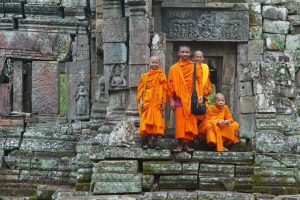
Krampusnacht
Krampusnacht is a little less friendly than the other jolly holiday traditions we’ve discussed. On Dec. 5 in Bavaria and some parts of Germany men dress up as the half-goat, half-demon known as Krampus. He hangs out with St. Nick. While St. Nick takes care of the nice kids, Krampus punishes the naughty by dragging them into the woods and eating them. Some say he is the inspiration for the Christian devil figure.
https://www.thoughtco.com/beware-the-krampus-2563016

St. Nicholas Day
On the other hand, we have St. Nicholas Day. He brings candy and treats to good children on Dec. 6 each year. The goodies like marzipan are stuffed in your shoes during the night. Unlike Santa, St. Nick doesn’t punish bad kids — he leaves that to Krampus. I know which list I want to be on this year. Although if Krampus comes to eat you, at least it’s before finals.
https://www.catholiccompany.com/getfed/st-nicholas-and-your-shoes/
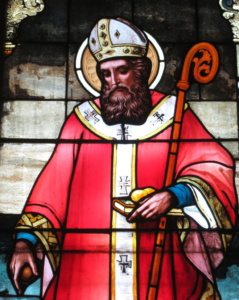
Pancha Ganapati
This holiday is the Hindu version of Christmas — but better. It starts with five days of presents from Dec. 21-25 and is the celebration of Ganesha. He is the god of obstacles with an elephant’s head. Ganesha was created by Parvati while Shiva was out hunting. When Shiva returned home he found a strange man, Ganesha, in the house who wouldn’t let him in to see Parvati, who was bathing. Shiva, being the god of destruction, cut off Ganesha’s head in a rage. When Parvati discovered what Shiva had done, she demanded that he fix things. Shiva went to the wilderness and replaced Ganesha’s head with an elephant’s. Ganesha has five rays of energy, Shakti, and each day of the festival the children dress Ganesha to match his Shakti of the day.
https://www.hinduismtoday.com/modules/smartsection/item.php?itemid=5071
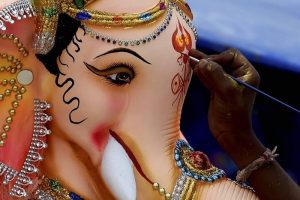
Yalda
Yalda is an ancient and lesser-known tradition. Yalda (which means birth) is the Iranian celebration of the winter solstice. This celebration pre-dates Islam to Zoroastrianism. It is the night when evil spirits run rampant before the Lord of Wisdom returns the next day. Gather your loved ones and stay up all night eating summer fruits to fend off bad luck. Celebrating the longest and darkest night of the year with joy brings luck and eating summer fruits on this night fends off colds.
http://realiran.org/yalda-night-celebration-all-you-need-to-know/
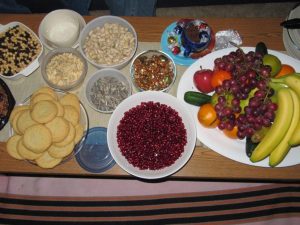
Chalica
Chalica, in comparison, is a relatively young holiday. It emerged in 2005 as a way to celebrate Unitarian Universalist principles. It begins the first Monday in December and lasts seven days. What does “Chalica” sound like? Chalice. Each day a chalice is lit celebrating the principle of the day and traditionally one must also do a good deed honoring that principle. These principles include:
“The inherent worth and dignity of every person;
Justice, equity and compassion in human relations;
Acceptance of one another and encouragement to spiritual growth in our congregations;
A free and responsible search for truth and meaning
The right of conscience and the use of the democratic process within our congregations and in society at large;
The goal of world community with peace, liberty, and justice for all;
Respect for the interdependent web of all existence of which we are apart.”
https://www.uua.org/worship/holidays/chalica
As you can see there are more December holidays than Christmas. A few of them even share Christmas traditions or originated from them. So talk to your friends and maybe celebrate something a little different this year. Or celebrate multiple holidays — nothing wrong with meditating or talking about human compassion. This holiday season is a time for celebration, forget finals and let’s have some fun.


